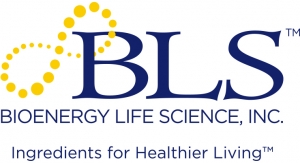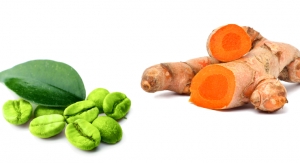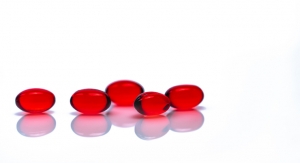09.26.18
Lycored lauded the publication of its clinical results in the peer-reviewed scientific periodical, International Journal of Sports Nutrition and Exercise Metabolism. In this clinical study, Lycored looked for the first time at the effects of a tomato-based supplement that mimics the natural composition of the entire tomato by combining the oil and water-soluble fractions of the tomato. The supplement used in the study was rich in carotenoids such as lycopene, phytoene and phytofluene (T-LPP) as well as other ingredients, and is rounded by the presence of Rosemary extract and folic acid. Within the paper, researchers reveal that consuming the supplement reduced muscle damage associated with exercise, specifically running.
The research, funded by Lycored and carried out by researchers at Appalachian State University's Human Performance Lab in North Carolina, highlights how consuming a T-LPP supplement results in a significant increase in the plasma levels of the carotenoids contained within the supplement, and revealed less post-exercise increase in the acute muscle damage biomarker, serum myoglobin, than in the placebo group.
The concept was tested in a double-blind, randomized, placebo-controlled crossover study and involved 20 male and female runners (ages 22-45 years) who regularly compete in long-distance road races and were capable of running for two hours on treadmills at around 65-70 percent of their maximum velocity. The group ingested the T-LPP supplement or placebo with their evening meal for four weeks prior to running two hours at high intensity. The study was conducted over a 10-week period that included two four-week supplementation periods, a two-week washout period (after which participants crossed over to the opposite treatment, and repeated all procedures), two exercise sessions and 12 blood samples. Measurements of participants' blood samples and delayed-onset of muscle soreness (DOMS) ratings were taken pre- and post-four-weeks of supplementation, immediately following the two-hour run, and then again at one-hour, 24-hours and 48-hours post-run.
"Previous animal and human data suggest that carotenoids and tomato phytonutrients may be useful in attenuating the oxidative stress and inflammation induced by prolonged and intensive exercise, however evidence is limited," said Dr. Karin Hermoni, head of science and nutrition at Lycored. "With this study we sought to extend on previous knowledge in several ways, including the utilization of a unique composition that combines among other ingredients, both the oil and the water-soluble fractions of the tomato. In this study we chose an exercise challenge bout that is known to induce physiological stress in study participants and directly evaluated the protective effect of the supplement on muscle damage biomarker."
Specifically, the study revealed that post-exercise serum myoglobin was lower in participants who ingested the T-LPP supplement, as compared to the placebo group. Myoglobin is an iron- and oxygen-binding protein found in muscle tissue that is translocated to the blood compartment following acute muscle injury from intensive exercise; thus considered a sensitive marker for muscle injury (Brancaccio, P., Lippi, G., & Maffulli, N. (2010). Biochemical markers of muscular damage. Clinical Chemistry and Laboratory Medicine, 48, 757-767).
Results from this study indicated that four-weeks of ingesting the T-LPP supplement containing lycopene, phytoene and phytofluene increased plasma carotenoid levels by 73% and diminished rises in the acute muscle damage biomarker, serum myoglobin, during recovery following a two-hour running bout that included downhill running.
"Optimizing muscle recovery, balancing muscle damage and enhancing muscle resilience to the stress associated with exercise are beneficial for both athletes and casual exercisers," added Dr. Hermoni. "This study utilized a modest dose of tomato carotenoids for a relatively short time period. These promising initial results are an important step, opening the door for additional studies to further explore the role of carotenoids and tomato phytonutrients in complementing an active lifestyle and allowing people to optimize the benefits of exercise."
It is important to remember that nutritional approaches and the use of dietary supplement in sports nutrition are intended to be just one piece of the puzzle- complementing other healthy lifestyle choices. Harnessing the power of nutrition to help balance the stress, muscle damage, and fatigue, can help keep ourselves in the best condition and enjoy the full spectrum of benefits that exercise holds.
Access the article in-full, titled, Effects of 4-weeks Ingestion of Tomato-Based Carotenoids on Exercise-Induced Inflammation, Muscle Damage and Oxidative Stress in Endurance Runners, online at International Journal of Sports Nutrition and Exercise Metabolism.
The research, funded by Lycored and carried out by researchers at Appalachian State University's Human Performance Lab in North Carolina, highlights how consuming a T-LPP supplement results in a significant increase in the plasma levels of the carotenoids contained within the supplement, and revealed less post-exercise increase in the acute muscle damage biomarker, serum myoglobin, than in the placebo group.
The concept was tested in a double-blind, randomized, placebo-controlled crossover study and involved 20 male and female runners (ages 22-45 years) who regularly compete in long-distance road races and were capable of running for two hours on treadmills at around 65-70 percent of their maximum velocity. The group ingested the T-LPP supplement or placebo with their evening meal for four weeks prior to running two hours at high intensity. The study was conducted over a 10-week period that included two four-week supplementation periods, a two-week washout period (after which participants crossed over to the opposite treatment, and repeated all procedures), two exercise sessions and 12 blood samples. Measurements of participants' blood samples and delayed-onset of muscle soreness (DOMS) ratings were taken pre- and post-four-weeks of supplementation, immediately following the two-hour run, and then again at one-hour, 24-hours and 48-hours post-run.
"Previous animal and human data suggest that carotenoids and tomato phytonutrients may be useful in attenuating the oxidative stress and inflammation induced by prolonged and intensive exercise, however evidence is limited," said Dr. Karin Hermoni, head of science and nutrition at Lycored. "With this study we sought to extend on previous knowledge in several ways, including the utilization of a unique composition that combines among other ingredients, both the oil and the water-soluble fractions of the tomato. In this study we chose an exercise challenge bout that is known to induce physiological stress in study participants and directly evaluated the protective effect of the supplement on muscle damage biomarker."
Specifically, the study revealed that post-exercise serum myoglobin was lower in participants who ingested the T-LPP supplement, as compared to the placebo group. Myoglobin is an iron- and oxygen-binding protein found in muscle tissue that is translocated to the blood compartment following acute muscle injury from intensive exercise; thus considered a sensitive marker for muscle injury (Brancaccio, P., Lippi, G., & Maffulli, N. (2010). Biochemical markers of muscular damage. Clinical Chemistry and Laboratory Medicine, 48, 757-767).
Results from this study indicated that four-weeks of ingesting the T-LPP supplement containing lycopene, phytoene and phytofluene increased plasma carotenoid levels by 73% and diminished rises in the acute muscle damage biomarker, serum myoglobin, during recovery following a two-hour running bout that included downhill running.
"Optimizing muscle recovery, balancing muscle damage and enhancing muscle resilience to the stress associated with exercise are beneficial for both athletes and casual exercisers," added Dr. Hermoni. "This study utilized a modest dose of tomato carotenoids for a relatively short time period. These promising initial results are an important step, opening the door for additional studies to further explore the role of carotenoids and tomato phytonutrients in complementing an active lifestyle and allowing people to optimize the benefits of exercise."
It is important to remember that nutritional approaches and the use of dietary supplement in sports nutrition are intended to be just one piece of the puzzle- complementing other healthy lifestyle choices. Harnessing the power of nutrition to help balance the stress, muscle damage, and fatigue, can help keep ourselves in the best condition and enjoy the full spectrum of benefits that exercise holds.
Access the article in-full, titled, Effects of 4-weeks Ingestion of Tomato-Based Carotenoids on Exercise-Induced Inflammation, Muscle Damage and Oxidative Stress in Endurance Runners, online at International Journal of Sports Nutrition and Exercise Metabolism.



























